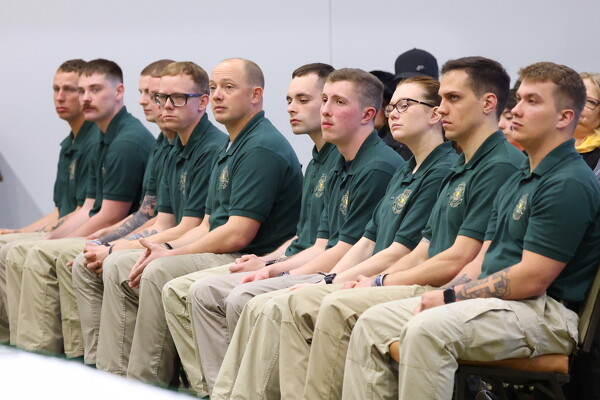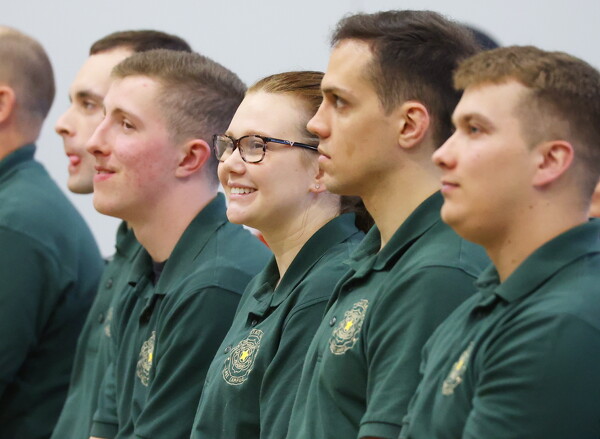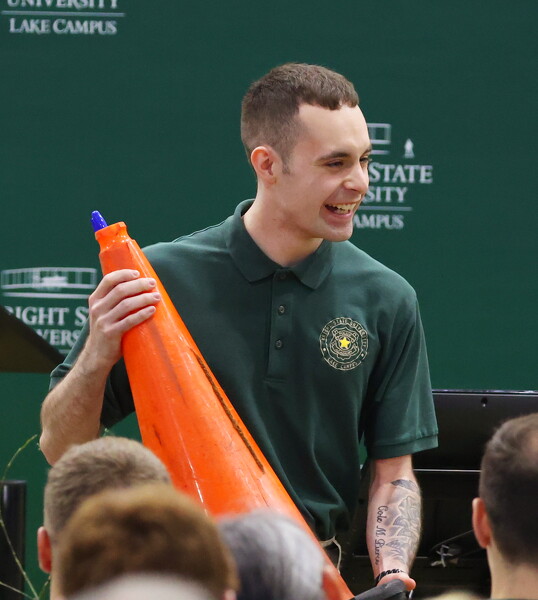
The Wright State University-Lake Campus Police Academy graduating class of eleven cadets.
CELINA - Mercer County's next sheriff offered some hard-earned wisdom from his 30-plus years in law enforcement to help 11 cadets begin their careers on the right foot.
Chief Deputy Douglas Timmerman, who is running unopposed for sheriff in this year's election cycle, was the keynote speaker at Wright State University-Lake Campus Police Academy's graduation ceremony on Monday night at the James F. Dicke Hall.
Those graduating on Monday night were Bradyn Adams, Tyler Dillion, Jessica Fledderjohann, Joshua Fledderjohann, Gavin Jones, Tobias Luebke, Austin McDonald, Branden Puckett, Tanner Robbins, Henry Spencer and Bud Vanover.
The cadets still need to pass the Ohio Peace Officer Training Commission Test but many have already landed jobs with local departments.
Timmerman encapsulated his accumulated insights in four core areas - family, respect, the badge and citizens.
"You will find that as you go through your career, you will face many challenges, things such as serious or fatal car crashes, natural deaths, suicide, rapes and maybe even a murder case, just to name a few," he said.
These cases will eventually take a toll on cadets' mental health.
"I have always found that you need a strong support group to get through these tough times," he said. "I am blessed that I have a very supportive family. Over the years they have seen me at my best and at my worst. We celebrate the best of times, and they supported me in the worst of times."
Family is the one thing cadets can lean on, Timmerman stressed, telling them to keep their loved ones at the forefront of their minds. It's important they don't take the job home with them.
"You need to find time to spend with your family," he said. "Remember, at the end of your career, you're going to walk away from this job and all you will have left is the memories. You're family will still be there, so make sure that you have done your part in keeping your family close."
Timmerman also had a piece of advice for cadets' family members in attendance.
"Please keep an eye on the family member who is getting ready to enter this very noble profession. You have a chance to be very impactful on how successful their careers will be," he said. "If you need to step in and get them help, then do it."
If a family does intervene, cadets must realize this is being done out of love, Timmerman said.
Timmerman said many times in his career he has seen young officers and deputies act insolently, to the detriment of their careers and their agency.
"If you want to see something that will halt or stop your success in your career quickly, that would be your lack of respect to your fellow officers or deputies," he said. "You have a chance to make a large impact on people and on your agency."
There will be times when officers and deputies may be hard on cadets.
"Understand that they are doing it for your best interest. Please take their advice to heart and when they have that crucial conversation with you, you need to take a good long hard look at why they are telling you that," he said.

Cadet Jessica Fledderjohann smiles as Commander Mark Ernst gives his presentation to the graduates.
The badge to be issued to cadets upon their first job will be shiny, both literately and figuratively.
"You will wear your badge with pride and it will represent your agency," Timmerman said. "Your badge should be worn with respect not only for yourself, but respect for the fellow men and women who share this same profession. That badge is a symbol of unity, courage and honor."
Only by doing the right things can cadets maintain their badge's luster, such as by helping others at the end of their shift, watching their language and putting in extra effort when they're physically and emotionally exhausted.
Likewise, there are actions that can tarnish the badge - laziness, not caring for one's fellow man, taking shortcuts and lying, Timmerman said.
"Take care of your badge by doing many good deeds, because we know a few small bad deeds will bring discredit upon yourself, your agency and law enforcement as a whole," he said.
Lastly, Timmerman implored cadets to always remember the purpose of their work.
"Our citizens deserve our respect," he said. "They are who we work for. Your heart and inner feelings should be that of 'How can I do something today to make someone's life better?'"
This can be done by helping a motorist change a tire, taking extra time on a call to listen to someone, stopping by a park to greet children and showing true compassion to someone who lost another, he said.
Citizens are the people who support law enforcement, he said. Their taxes pay the wages and benefits of officers and support the construction and maintenance of jails and police departments. They also provide food during the holidays, post kind messages about law enforcement on social media and thank officers in person.
"We need to understand that we are here to serve them and that we are a better team with them on our side," Timmerman said. "This job is not us versus them, this job is us working with them and for them."
The police academy started in 2002 under Kip Wright, who headed it until 2011 when Mark Ernst took over as commander. There are about 30 instructors, ranging from state troopers to deputy sheriffs to BCI agents.
The program lasts eight months from August to April and includes more than 740 hours of training. Topics include firearms, driving, first aid, legal issues, de-escalation, handling the special needs population, people with mental health issues and the elderly.

Cadet Gavin Jones laughs as he walks back to his seat carrying a beat up traffic cone after winning the award for Worst Driver.
